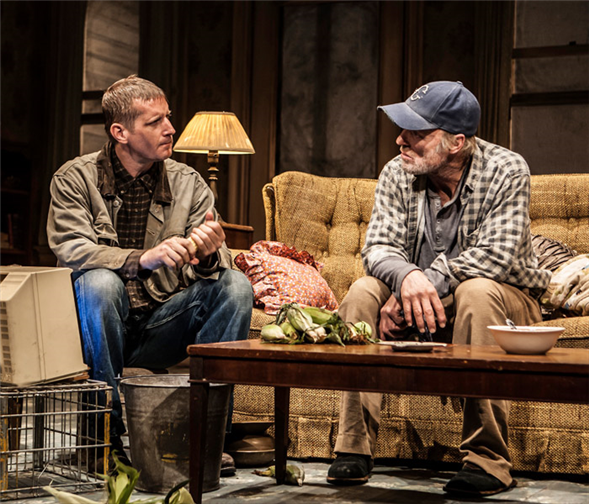Translate Page

The brutal emotion of Buried Child
---
You could bruise your brain trying to make literal sense of Buried Child, Sam Shepard's Pulitzer Prize-winning play about a hardscrabble family of Illinois farmers whose dark history has warped them for generations. Their misshapen deeds – bluntly described in the title – are matched by a dramatic structure that refuses to behave naturally (or at least naturalistically).
To wit: When Tilden, the son of a dissolute wreck named Dodge, brings ears of corn in from the yard, Dodge insists there's no corn outside at all. Even when Tilden dumps the husks on his head, he doesn't change his mind. Similarly, when Tilden's own son Vince shows up with his girlfriend, no one can decide if they've seen the boy before. Is he their kin or isn't he?
Don't look for a definitive answer. Queasy ambiguity is fundamental to the play, which the New Group is currently staging in a production at the Pershing Square Signature Center. By making them so vague and rough and confused, Shepard tells a particular kind of truth about these characters.
"There's something very emotional about what he writes," says Paul Sparks, who plays Tilden in the New Group's revival. "The reason you want to do his plays is that he speaks to some part of you that isn't about comprehending what's going on in a logical, intellectual way. He has these things that don't make sense, and yet they make so much sense."
Watching the play, for instance, we may not know whether the corn is real, but we are certain this family has ruined itself. The ground out back that is and isn't fertile; the younger generation that may or may not be recognizable; Tilden's brother, who is missing a leg; his mother, who talks in loops, repeating the same platitudes over and over. They all seem like the spiritual consequences of burying a child for a bad reason.
{Image1}
But what is an actor supposed to do with that? After all, a performer still needs to activate a character, no matter how "conceptual" he is.
"As we've worked on this play, I've realized it's so slippery," Sparks says. "I'm not totally sure what is going on sometimes – still. Which is very unusual, I'd say. After I've been in a play for a while, I'm pretty good at figuring out what works and what doesn't work and really drawing the line of, 'This is what happens to me in this play.' But this one is hard to hold onto like that. And I think that's how Sam wants it to be. It's a fever dream."And so Sparks – whose theatre credits have recently been augmented by recurring roles on House of Cards and Boardwalk Empire -- has to "give over" to the uncertainty. This means giving weight to scenes he viscerally understands, even if he can't tie the emotion to rational thought. "Because Sam is so cryptic about what is actually going on, there are so many different avenues that an actor can choose to go down," he says. "It's so open and so dense and supports so many different ideas that there's a lot you can bring to it. But tonally, you have to strike a balance between what's theatrical and what's honest. It's a dangerous line to walk, because you can fall off it on either side."
As an example, he points to a scene near the end of the play, when Tilden returns with something disturbing he has found on the family's property. He shows it to Vince, and it's obvious it has a powerful impact. Because there's no explicit dialogue to clarify what's happening, Sparks has to be careful not to oversimplify his behavior by making the moment, say, too sad or too angry. At the same time, if he doesn't inject his entrance with some kind of feeling, it could feel self-indulgently "poetic."
He explains, "I'm not totally sure what it is, but I do know that it's a big deal. And in those moments, I just walk out, take in what's going on and what I'm holding in my hands, and just follow what I'm doing in the play."
Meanwhile, the audience must follow him, choosing our own interpretation of what we see. "I heard Sam giving an interview, and he said that he likes actors who will walk to the edge of a cliff and jump," Sparks says."And I think he likes an audience to do that as well."
---
TDF Members: At press time, discount tickets were available to Buried Child. Go here to browse our current offers.
Follow Mark Blankenship at @IAmBlankenship. Follow TDF at @TDFNYC.
Photos by Monique Carboni. Top photo: Paul Sparks (left) and Ed Harris